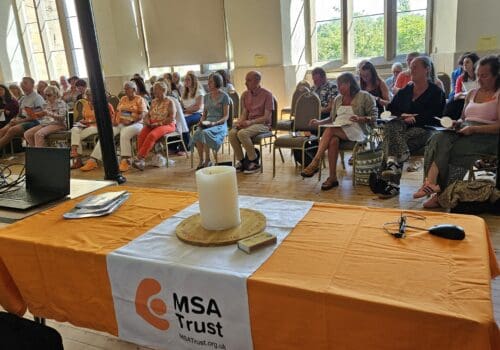MSA Research Symposium- Afternoon Session
The Research Symposium afternoon was split into two sessions; Towards Improving Diagnosis and Prognosis of MSA and New Horizons in MSA Drug Trials.
In the first session Professor Panicker talked about the latest diagnostic criteria for MSA and how the criteria will support improved diagnostic accuracy and earlier diagnosis for people with MSA.
Dr Iodice then spoke about autonomic features of MSA, and whether autonomic biomarkers would be helpful to aid early diagnosis. Autonomic features include bladder issues, fainting, constipation, and sleep disorders. Dr Iodici’s team have looked at how autonomic tests may be able to act as a ‘biomarker’ to identify people with MSA at an earlier stage – this work is ongoing.
Dr Goh then talked about the PROSPECT-M Study, which tracks people with MSA over time and is building a robust database of clinical and biobank information that acts as a research resource for studies into MSA.
Dr Christopher Kobylecki talked about the use of PEG – a feeding tube – in people with MSA, including what evidence and clinical guidance there already is for PEG use and what would be useful to know in future.
The second session focussed on clinical trials. Professor Huw Morris introduced the Horizon Phase I trial which will look at feasibility and safety of using antisense therapy in people with MSA. An antisense therapy binds with RNA, halting the process of creating a disease-causing protein at a genetic level. If shown to be safe, this could lead to further trials to examine if such therapy could have an effect on the progression of MSA.
David Stamler MD presented information from Alterity Therapeutic’s Phase II trial of a compound called ATH434, which is being tested to see if it affects levels of iron accumulation in the brain.
Professor Foltynie shared an update on the phase II study of Exenatide. Exenatide is a GLP-1 receptor agonist used in the treatment of diabetes and is being tested in people with MSA to see if it has any effect on the progression of MSA.
The day finished with Dr Iodici sharing data from a study of a medication called Ampreloxetine which can improve symptoms of postural hypotension.
The day was a great success, allowing researchers the opportunity to share their findings, network with colleagues and harness shared enthusiasm and momentum for research into MSA.
Disclaimer: The views and opinions expressed in the blogs published on these pages are those of the authors and do not necessarily reflect the official policy or position of the MSA Trust.
Recent Posts

MSA Candlelight 2025
19 Jun 2025 | 2 comments

International Nurses Day 2025
12 May 2025 | 1 comment

